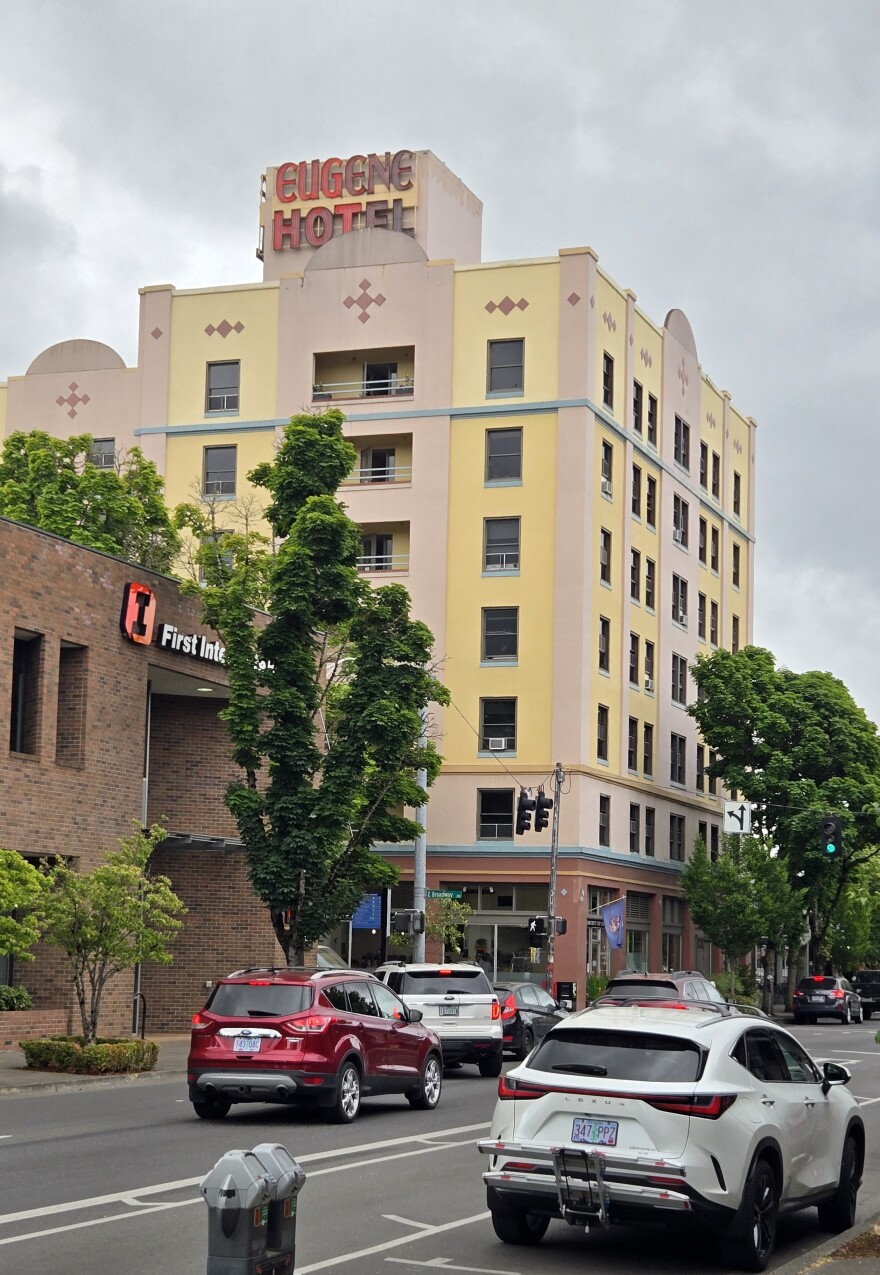If you walk through the Eugene Hotel Retirement Community today, you get a glimpse of the building’s storied history.
“We tried to capture the charm of the building from the past, from way back when, decades and decades ago,” said Lindsey Black, EHRC’s Community Relations Director.
That history hangs on the walls, from photos to memorabilia of its 100 years in operation.
In 1916, the hotel’s first owner, Bird Rose, bemoaned the lack of what he called "a decent hotel" for guests coming to see University of Oregon football games.
Nearly a decade later, his new hotel opened for business at the southeast corner of Broadway and Pearl Street. According to an article in the Eugene Morning Register, which is on display in the building's lobby, the hotel's cost was "nearly half million."
It was "one of the handsomest in the northwest,” the article continued.
For the next 58 years, the hotel would host a variety of notable guests, including top-level government officials like Eleanor Roosevelt, Richard Nixon and Ronald Reagan.

In May 1968, presidential-candidate Robert F. Kennedy stayed in the hotel while campaigning in Oregon just before heading to California, where he was assassinated nine days later – a timeline that's fudged in the building’s historic registry paperwork, which claims Kennedy was killed "the following day."
The hotel also hosted noted actors during a time when Oregon was the filming location for several noted Hollywood films. Its guests in that era included Michael and Kirk Douglas, Lee Marvin, Ernest Borgnine and Jack Nicholson.
Nicholson’s first stay came not long after Kennedy’s, according to Katherine K’iya Wilson, a film industry veteran who wrote the book “Echoes From the Set: 50 Years of Filming on Location: Hollywood and Oregon’s Cinematic Voices.”
Nicholson came to town to film a scene of the film “Five Easy Pieces.”
“And then Warren Merrill, the film Commissioner, invited [Nicholson, director Bob Rafelson and cinematographer László Kovács] to Thanksgiving dinner at the Eugene Hotel, and they ended up staying five days,” said Wilson.

Nicholson would return to Eugene in the 1970s to film a movie he wrote and directed, “Drive, He Said,” and later returned to Oregon to film “One Flew Over the Cuckoo’s Nest” and portions of “The Shining.”
In the late ‘70s, another actor would find himself in the Eugene Hotel—this time in its downstairs ballroom—and that visit would help bring about one of his most well-known characters.
“We were filming ‘[National Lampoon’s] Animal House’ and I cast Otis Day's Knights from different musicians that played at the Eugene Hotel,” said Wilson, who served as a location scout and local casting director on the film.
Those musicians often played at the hotel, which became the epicenter of a thriving blues scene in Eugene.
“The Eugene Hotel is pretty close to where they were filming. And you got a lot of young people involved in making a movie like that, and they like to go out and carouse after work hours,” said Johnny Etheredge, a longtime Eugene radio DJ who was a regular at the shows.
Wilson said the filming of the toga party scene had to stop one evening because one band member, Robert Cray, had a gig at the hotel, playing with fellow Eugene blues musician Curtis Salgado.
Some cast and crew followed along, including Wilson and the movie’s biggest name, John Belushi.
As the evening went, Wilson recalled Belushi getting very enthusiastic about the music, bringing her onto the dance floor.
“Then Curtis Salgado goes ‘And now John Belushi is going to crawl up on stage and sing, ‘Hey, Bartender.’ And the crowd just went nuts,” she said.

“The genesis of the Blues Brothers was made [that night]. It was acknowledged by Belushi,” said Etheredge.
“Animal House” was filmed in 1977, and the Blues Brothers made their first appearance on Saturday Night Live on April 22, 1978. An introduction to the performance mentions both Cray and Salgado, and the band played “Hey, Bartender,” with Belushi singing and his fellow SNL cast member and blues enthusiast Dan Akroyd playing harmonica.
The Eugene Hotel’s heyday as a blues venue would not last much beyond that time. In 1983, a new owner transformed the building into what it is today: apartments for people 58 years and older.

Its illustrious history has served as a selling point for potential residents, Black said, noting that it landed at least one.
“The minute she saw it, 25 years before she moved in, she just thought, that's the place for me, because it had so much charm, so much character,” said Black.
Wilson said that, despite the building no longer being a live music venue that drew noteworthy names, the Eugene Hotel still holds a place in her heart.
“I love it!" she said. "I call it the crown jewel of Eugene.”






